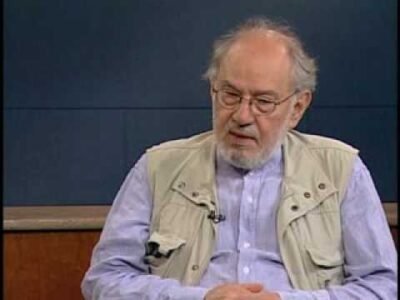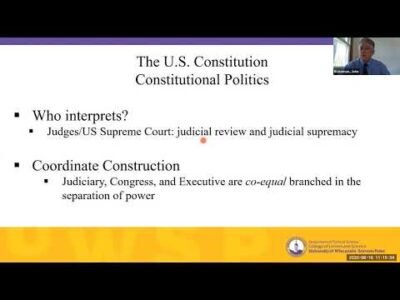JONES: This second lecture will deal with one of the powerful influences on our culture today, namely I’m looking at the rise and demise of secular humanism. I think it’s important that we understand today’s culture. And I really am so happy that there are young people listening to me because while some
Of you my age will say, “You’re saying what exactly what I understand and have lived through.” Sometimes our young people have difficulty figuring out what’s happening because they have not lived through this kind of thing. So I address them in particular.
And to understand our culture, we need to see that there are two fundamental ideologies that I will show at the end of my lectures possibly are really the same because they’re Oneist, namely secular humanism and revive paganism. They’re very different but at the end of the day, they are in their fundamental orientations
Of the world — Oneist. You know when I first came in 1964, I mention how amazed I was to see Christian America. And the other thing that amazed me was how much people lived in fear of communism. There were commies behind every bush.
And of course the McCarthy investigation of communist agents was just finished and many on the left poopooed that but it’s actually been shown that there were many communist agents in America during that time. But we were worried because this godless system of communism or Marxism was spreading throughout
The world in this sort of a domino effect from the Soviet Union to China, to Korea, to Vietnam, to Cuba. And you know the ’60s revolution was very much a revolution against the Vietnam War whose motivation of course was to oppose communism.
So we have radicals who still actually now have power who were part of those refusing to denounce communism which is sort of interesting. So the threat in the ’60s was not a religious threat but a nonreligious materialism in its various forms. In its political form of course — atheistic Marxism.
But it is also had an intellectual form called secular humanism and that was something that we all realized and perhaps still realize as a fundamental opponent of the Christian faith. Humanism was celebrated in the Renaissance just before the Reformation as the rediscovery
Of the value of the individual human being and his reason over against the power of the church. And many of us have seen the importance of that movement and of course it’s easy to describe the work of Martin Luther as an expression, in a certain sense, of that humanistic understanding
Of the importance of the individual. But of course, like most things, its good parts can be turned to bad. And what you have you see is, from the intelligent use of individual reason which has produced the incredible successes of Western culture through science and technology.
So, that one day human beings would walk on the moon; this kind of thinking became more and more enamored of its own power and felt that it was the only way of relating to the world — that human reason was the source of truth.
And belief in a world created by God and of reason created by God was dismissed as religious superstition and myth. And so for modern man — religion had to go, and this is why we have known and recognized that secular humanism is a massive attack on Christianity.
So from the 18th Century on what’s called “The Enlightenment” — “the age of light” if you like; this view of reason as the ultimate source of authority for human existence developed in a powerful way. Optimism in what mankind could produce, its capacities to bring about a better world took
The minds of intellectuals by storm and of course invaded the university. So that, so many of our intellectuals bought into this system. Bringing about if you like this vision of a kingdom of man on earth, you can already see how Oneist that is, right?
If it’s simply depending on human beings to put the world together, it is a form of Oneism. It was known as the religion of humanism and it was particularly expressed by the French Revolution. I spent eighteen years in France, so I love the French but I see their weaknesses too.
In 1789, the Paris revolutionaries built an altar to the goddess ‘Reason’ in Notre Dame Cathedral, can you believe that? There was an altar right in the center of that incredible medieval church and they celebrated to goddess ‘Reason’. The French philosopher who was part of this French Revolution — Voltaire, was fundamentally anti-Christian.
He was a friend by the way of Benjamin Franklin, who himself was a very conflicted man because some of you know that Benjamin Franklin was fascinated by George Whitfield and helped pay for some of his campaign.
And yet he was also a friend of Voltaire, one of the leading atheists of the 18th Century. Voltaire came up with the famous phrase “écrasez l’infâme,” — “Crush that vile unspeakable thing.” This became the battle cry of The Enlightenment, but it was actually Christianity that was the vile and unspeakable thing.
And so there were thousands of heads of priests and so on that were separated from their bodies through the French Revolution. The Emperor Napoleon asked Pierre-Simon Laplace, — the great French scientist if he believed in God; he was reputed to have said, “I have no need of that hypothesis.”
This is a movement, a very powerful movement in the West, and as western history develops in the 18th and 19th Centuries, you find leading intellectuals actually predicting the end of religion. In the 21st Century, we should be seeing the end of religion according to these predictions.
Ludwig Feuerbach called Christianity a “delusion,” “a gigantic human projection.” You remember Karl Marx described religion as “the opiate of the people,” the sign of a wrongly ordered society. “Man,” said Marx, “is the supreme divinity.” By the way, another expression Oneism.
But these people didn’t want to be called religious by the way; they weren’t religious, they were rational. Of course why did they believe in their own rationality, that was a faith statement by the way. Friedrich Nietzsche declared “Gott ist tot,” “God is dead.”
The tradition of Christianity was now being buried by these leading philosophers. Sigmund Freud in his book “The Future of an Illusion” speaks about religion in particularism his own Judaism as a “mass delusion, a collective neurosis which enshrines our infantile longing.”
He actually describes it as a serious pathological condition from which one needed to be healed. Really massive anti-religious mindset going on amongst the intellectuals of the 19th and 20th centuries. And that continues to this day in 1976, Richard Dawkins, one of the new atheists, in his book
“The Selfish Gene,” describes faith, quote, “as a kind of mental illness.” So here we have this rationalistic approach to eliminate faith and religion as a form of illness. And of course we saw this kind of thinking invade the church; that’s what liberalism is, you see.
Liberalism is the adaptation of the world’s kind of thinking and trying to make it Christian, that’s what liberals have done all through the ages since the beginning. Christianity, beginning with the Gnostics, who were the original liberals who tried to take pagan notions of the mystery religions and make them Christian.
So that’s the mechanism that liberals use. And when I was studying New Testament at Harvard, of course that was the great goal — to reinterpret the New Testament by demythologizing the supernatural. Demythologizing means taking away the myths and getting to the heart which really the
Heart was sort of a sense of one’s own existential being faced with nothingness; that was the real meaning of Christianity in the New Testament. So there was no miracles and certainly no resurrection of Jesus. And then of course, the mainline churches buy into this kind of thinking.
But of course, someone has said, “If you marry the spirit of the age, you will soon be a widower.” And we’ve seen mainline churches going down in their effect in our culture. And Liberalism thus defined the Gospel as mere social work, and saw Jesus only as an
Example not as a divine Savior, that was myth of course you see, so myth had to go. The Gospel was redefined in terms of Marxist politics. Liberation theology became all the rage, and Jesus was little more than a cake of 20th century revolutionary theory.
On a different level, the secular humanists were greatly influenced by Darwin, who would effectively eliminated belief in “God the Creator,” and proposed in place of “God the Creator” the idea of an unguided and impersonal process of natural selection.
Life came about by mere chance, and man was seen as the result of purposelessness and a mere natural process, that did not have him in mind by the way, and so we are really the result of chance.
It’s incredible to see how far people can go with that as an explanation for the incredible beauty and power of what we represent as human beings. The way our bodies have put together. The way our minds can function. There’s no valid explanation of this in secular humanism and yet so many liberal thinkers
Adopted it. Science was the only way of knowing anything about anything. And so, there was a belief that religion would disappear. When I came to the states in the ’60s, I was asked to read books on ‘the death of God’.
And this was all the rage and we were sort of told that this was the proof (and I wasn’t at an evangelical school and I don’t really blame my professors for seeing it this way, I saw it that way) that the death of God was the proof of the success of secular humanism.
That man no longer needed God as a hypothesis, he was now fine on his own. The final triumph then of secular humanism is to declare in America in the ’70s that God had died. Secular humanism had won. Now in a certain sense, these predictions have come true.
We’re seeing the decline of the Christian faith in the population as a whole. No longer are many people influenced by a Christian way of thinking and I don’t think we should hide our eyes from that. And in that sense we’ve seen the decline of attachment to the Christian faith.
Now, this is a massive change. People no longer actually believe in God the Creator and so they can do anything they want to, but that was not always the case. In 1890, the Supreme Court in United States defined religion as “one’s view of one’s relation
To his Creator, to the obligations they impose of reverence for his being and character and obedience to His will.” That was the statement of the Supreme Court in 1890. There was no other definition of God but of a personal transcendent creator.
But thanks in many ways to secular humanism, this is no longer the case in public discourse. So what is ‘secularism’ or secular humanism? Let me give you a simple definition, it comes in various names. As an intellectual discipline, it is known as “philosophical materialism,” that matter is ultimate. That’s the philosophy of materialism. As a religious expression, it is called ‘Atheism’, the faith belief that there is no God. There’s no — you can’t prove that rationally, right? So an atheist has to be in some sense a religious believer.
As a political form, it is practiced as ‘Marxism’ and various forms of socialism. And for many people, it’s simply a default way of thinking of living without any notion that God exists. That’s probably the way most people practice this kind of thinking.
But in all these expressions of secularism, it’s a consistent rejection as a mere ancient superstition, a sort of a holdover from the Middle Ages and we must refuse that kind of mythology if we want to really do our world good. Now, this kind of a view still dominates the western universities.
Some of you young people that go to schools around here will confirm that your professors — many of them believe in this kind of rationalism or secular humanism. However, this is not the whole story. Just as these philosophers of the 19th and early 20th century were predicting the end
Of the withering away of religion in a kind of ironic turn of events. We are now seeing the withering away of secular humanism, did you realize that? You probably don’t always see it, but this is happening and many people are talking about it.
And the withering away of secular humanism, (oh let me just say it) the proof is, how many people now say, “I’m spiritual but not religious?” In other words, they are making a claim to spirituality which doesn’t fit with secular humanism, right? — That’s superstition. Any kind of faith is superstition.
Well, the reasons why this movement of secular humanism is on the decline and indeed is withering away, is that while it was so optimistic and full of self-confidence; secular humanism produced two devastating World Wars that produced the death of millions. In some of its socialistic expressions it became totalitarian fascism.
And some of its great leader was Stalin, Hitler and Pol Pot that produced the murder of countless millions, in the name of secular humanism. That doesn’t give a movement too many honors. And of course from that — you have wild industrialization, ecological disasters; but as I was indicating
Earlier, one of the real problems is that many people have begun to feel that without some kind of spirituality they can’t exist in this world. And that’s what secular humanism does; it leaves us with a soulless materialism without any sense of a meaning in a spiritual way of thinking.
And so secular humanism produced a profound sense of alienation from the rest of the universe. So we human beings, you see, are isolated in this massive cosmos, and we have no real relationship with the outside and so we have a profound sense of alienation. Have you met people like that?
They are looking for a sense of wholeness. “W-H.” (I didn’t say holiness, I said whole-ness) they want to belong somehow to more than a mere physical. But there is another reason why secular humanism is in decline. It is severely weak as a philosophical system. What do I mean by that?
Well, you see, to be a secular humanist, you have to believe in the validity of human reason. But in order to believe in human reason, you have to presuppose it. So to demonstrate that, you have to presuppose it. So it’s a perfectly circular way of thinking, does that make sense?
In order to prove reason, you have to presuppose it. And to presuppose it, that’s a faith statement that the world is rational. You don’t have all the information, right? You don’t sit outside of the cosmos and look down, ‘Oh yeah, that’s rational’. You have to presuppose that.
And some scholars have realized that this is not a ground for establishing secular humanism. The postmodern critique of secular humanism which argued that all major ideas are simply human notions and they are not scientific or philosophical, included the critique of secular humanism oddly.
So postmodernism — the thinkers of whom were probably the sons and daughters of secular humanist turns around and eats up their parents. There are two reasons really why secular humanism is on the decline. The first, is it really cannot stand against true biblical theism.
The conversion of Antony Flew — the great atheist is an example of that. He stated this, “It is simply inconceivable that any material matrix or field can generate agents who think and act. Matter cannot produce conceptions and perceptions such a world has to originate in the living source, a mind.”
The greatest atheist of the 20th century finally has to admit that secularism cannot justify the human mind. Isn’t that beautiful? But then, finally, there’s a new way of thinking. It is the thinking of this new spirituality. David Miller, who was a professor at Syracuse University, and was one of the ‘death of God’
Theologians actually said, “At the death of God, you will see the rebirth of the gods and goddesses of ancient Greece and Rome.” That’s not secular humanism. That’s a justification of a belief in all the gods. What did Miller know that we didn’t know as we read him in the ’70s?
Well, he was a devout follower of Carl Jung. And that will be the subject of my next lecture. Thank you.
#Rise #Fall #Secular #Humanism #Religions #Peter #Jones






No comment yet, add your voice below!